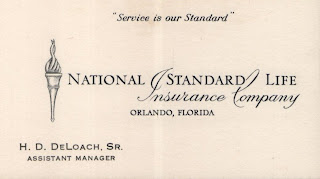The family vacation in the summer of 1967 was the only vacation I can remember that didn't involve a predetermined destination. Seven of us—my parents and the five children still at home—crammed into the family sedan and headed north out of Palatka. Paula was a year out of high school, Kathy was a senior-to-be, George was 13, Ava was 12, and I was 10. One of us sat under Daddy's elbow in the middle of the front seat, and the other four made the best of it in the back seat. I'm sure there must have been some discomfort in the car, but I don't remember experiencing any.
I think Daddy's plan was to drive until half the cash in his pocket was gone and then turn around and head home. Our northernmost stop on the five day trek was Asheville, North Carolina. It was a glorious trip. We didn't miss a single tourist trap along the way. I handled every trinket in Cherokee, North Carolina that could be bought with the money Daddy had given me and many that couldn't. I brought home a rabbit pelt.
1) My dad could pack a car trunk like nobody else. All the luggage would be on the driveway behind the car with Daddy protesting that it couldn't possibly fit. And yet, he got it all in—every time. He was a master at Tetris before the game was invented.
2) It didn't matter if there was a radio station in range because Daddy had all the hits of the thirties, forties, and fifties in his head. He had the most beautiful baritone-tenor voice, and I somehow took it for granted that everybody's dad could sing like that.
3) When Daddy started talking about finding a place to spend the night, the kids would start clamoring for him to stop at a motel with a pool. He would express doubts about finding such a place or it being affordable if he did find it, and, as if on cue, we would ratchet up the pleading. In retrospect, I don't think we ever stopped at a place without a pool, and Daddy nearly always got in the pool with us. I think he just enjoyed our entreaties, the faux suspense he was creating, and the subsequent cheering when he pulled into the parking lot of a pool-equipped motel. He was our hero again.






